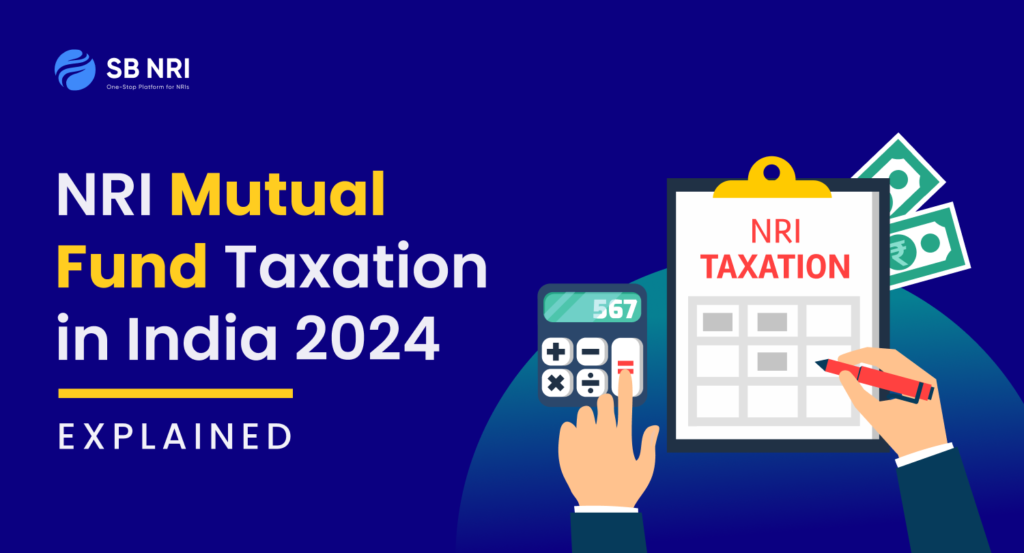
India’s stable investment scene and growing economy has made it a great investment hub for Non-Resident Indians (NRIs) and Overseas Citizens of India (OCIs). Over 72% of NRIs are already looking to diversify their investment across India citing stable investments. Mutual Funds, among these, is one of the top preferred investment instruments for NRIs/OCIs to grow wealth. However, the lack of clear answers in areas like mutual fund taxation for NRIs often confuses them and stops them from taking that final step. So, we thought of covering all you need to know about NRI mutual fund taxation in India for 2024 in this blog.
Investing in Mutual Funds as NRI
NRIs can legally invest in Indian markets via mutual funds. This includes NRIs, Persons of Indian Origin (PIOs), and Overseas Citizens of India (OCIs). There are a few legal mandates like getting their Mutual Fund KYC done along with adhering to the rules of FEMA, SEBI, and RBI. Once your KYC is done, you can invest in domestic and international mutual fund schemes offered by Asset Management Companies (AMCs).
Getting your NRI Mutual Fund KYC is mandatory to open an account to invest in mutual funds in India irrespective of the investment amount. The Securities and Exchange Board of India (SEBI) has specified a set of regulations under the Prevention of Money Laundering Act (PMLA), 2002 which mandates that mutual fund houses and intermediaries perform their due diligence on investors before they are compliant to make investments.
Also read: NRI Mutual Fund KYC in India: The Ultimate Guide 2024
What is Mutual Fund Taxation?
The profits or returns generated from investing in mutual funds are known as Capital Gains. These capital gains are then subject to taxation for investors.
Also read: Best Mutual Funds for NRI in India 2024
What are the factors that affect the NRI Mutual Fund Taxation?
Following are the factors that affect the NRI mutual fund taxation:
- Types of Funds: The taxation rules vary based on the category of mutual funds, such as Equity Mutual Fund, Debt Mutual Fund, Hybrid Mutual Fund, etc.
- Dividends: Dividends represent a portion of the profits distributed among investors by mutual fund houses.
- Capital Gains: The term ‘capital gains’ refers to the profits generated when investors sell their capital assets at a higher price than the total investment amount.
- Tax Deducted at Source(TDS): TDS is advance income tax that is deducted before making payment of mutual fund redemption amount by the AMC to the user.
- Holding Period: The duration between the purchase and sale of mutual fund units is termed the holding period. The holding period determines Short Term Capital Gain(STCG) or Long Term Capital Gain (LTCG). Basis that, the applicable tax rates are levied on the gains.
Also read: 10 Mutual Funds That Doubled Wealth In 5 Years

Determining Residential Status and Tax Implications
1. Who is an NRI investor?
To understand mutual fund taxation for NRIs in India, it is important to determine that an individual investor is an NRI. An NRI (Non-Resident Indian) is someone who is a citizen of India but not a resident of India i.e. is now living outside India. Residential status of an individual, whether a resident or non-resident, is determined under Section 6 of the Income Tax Act.
As per Section 6 of ITA, a citizen of India is considered to be an NRI if he/she is not a resident of India and an individual is deemed to be an Indian in any previous year if he/she meets any of the following criteria:
- If an individual resided in India for a period of 182 days or more during the previous year; or
- If he/she lived in India for a period of 60 days or more during the previous year and 365 days or more during 4 years immediately preceding the previous year.
An Indian citizen who does not meet the above-mentioned criteria is considered a non-resident Indian or NRI. However, the rules to determine the residential status of an individual change over time. Hence, you must be aware of new rules for NRIs.
For more info on NRIs, PIOs, and OCIs, you can refer here.
2. Are mutual funds taxed for NRI?
NRIs are liable to pay tax on income earned or received in India. However, certain incomes are exempt or have reduced tax rates for NRIs. As for NRI mutual fund taxation, it depends on the kind of mutual fund, i.e. debt or equity, and the holding period of the said mutual fund. We’ll enlist the taxation for various mutual funds for NRIs down below.

Capital Gains Tax on Mutual Funds for NRI
| Type of Mutual Fund | Short-Term Capital Gain (Holdings of less than 1 year) | Long Term Capital Gain (Holdings of more than 1 year) |
| Equity Mutual Fund | 15% | No LTCG up to 1.25 lakh. 12.5% on LTCG above 1.25 lakh without any indexation benefits |
| Debt Mutual Fund | As per the Income Slab | As per the Income Slab |
| Hybrid Equity-Oriented Mutual Fund | 15% | No LTCG up to 1.25 lakh. 12.5% on LTCG above 1.25 lakh without any indexation benefits |
| Hybrid Debt-Oriented Mutual Fund | As per the Income Slab | As per the Income Slab |
| Liquid Funds | As per the Income Slab | As per the Income Slab |
| Dividend Income | As per the Income Slab | As per the Income Slab |
Note: After Union Budget 2023 Amendments, Debt mutual funds will no longer be allowed to avail of indexation benefits from FY 23-24. Any gains made on debt mutual funds investment will now attract taxation on applicable slab rates of the investor’s income bracket. Please refer to the below section for a detailed guide on taxation on mutual funds for NRIs.
Tax Deducted at Source(TDS) on Mutual Funds for NRI
TDS applies to the redemption of mutual fund units for NRIs. The exact rate of TDS depends on the type of scheme and the holding period. Given below is a table clarifying the TDS rates as per see:
| Type of Mutual Fund | TDS on Income under IDCW | TDS on STCG (Holdings of less than 1 year) | TDS on LTCG (Holdings of more than 1 year) |
| Equity Mutual Funds | 20% | 15% | 10% |
| Other than Equity Oriented Fund | 20% | 30% | Listed – 20% with indexation Unlisted – 10% without indexation |
Equity Mutual Funds Taxation for NRI
In the case of equity mutual funds, any holding of less than one year will be termed as short-term, and selling of such investment will carry a short-term capital gain (STCG) of 15%. Similarly, for equity mutual fund investments held for more than a year, long-term capital gains (LTCG) up to 1.25 lakh per year will be exempt. Any LTCG above Rs 1.25 lakh will be levied at 12.5% without any indexation benefit.
Also read: Best SIP to Invest in 2024 – Top 10 SIP Mutual Fund Plans for NRIs/OCIs
Debt Mutual Fund Taxation for NRI
The debt mutual fund tax has been changed with effect from April 1, 2023, after the Budget 2023 brought certain amendments. Debt mutual funds will no longer be allowed to avail of indexation benefits from FY 23-24. Any gains made on debt mutual funds investment will now attract taxation on applicable slab rates of the investor’s income bracket.
How does new taxation on Debt Mutual Funds work?
Let’s take the following example for clarification and compare the old taxation vis-à-vis new taxation.
Example: Mr Anurag invested Rs 15,00,000 in FY 2017-18 in debt mutual funds. He sold the same after holding it for three years in FY 22-23. Here’s a comparison of his taxation pre-amendment and new rules.
| Sale Price | 25,00,000 |
| Investment Amount | 15,00,000 |
| Indexed cost of Investment (Investment*331/272) | 18,25,368 (rounded off) |
| Long-term capital gain (Sale Price – Indexed Cost of Investment)Note: CII for 2017-18 was 272 and CII for 2022-23 was 331 | 6,74,632 |
| LTCG payable @20% | 1,34,927 |
Now let’s take a present-day case for comparison:
Example: Mr Anurag invested Rs 25,00,000 in debt mutual funds in FY 23-24 and sold the same in FY 27-28 for Rs 37,00,000. Basis new mutual fund taxation 2024, here’s how it will taxed:
| Sale Price | 37,00,000 |
| Investment Amount | 25,00,000 |
| Capital gain (Sale Price – Cost of Investment) | 12,00,000 |
Note: Your capital gains will be part of your income for the said FY when you sell the debt mutual fund and accumulate the capital gains. This will then be taxed as per your income slab rates for the year.
Also read: Best NRI Investments in India: Top 10 Investment Options for NRIs/OCIs in India 2024
Hybrid Mutual Funds Taxation for NRIs
The taxation rate for capital gains on hybrid or balanced funds depends on the equity exposure within the portfolio. Should the equity exposure surpass 65%, the fund scheme is subject to taxation similar to an equity fund; otherwise, the taxation rules applicable to debt funds come into play. Here’s a brief of these:
- Hybrid Equity-Oriented Mutual Fund Taxation: In the case of hybrid equity oriented mutual funds, any holding of less than one year will be termed as short-term, and selling of such investment will carry a short-term capital gain (STCG) of 15%. Similarly, for equity mutual fund investments held for more than a year, long-term capital gains (LTCG) up to 1.25 lakh per year will be exempt. Any LTCG above Rs 1.25 lakh will be levied at 12.5% without any indexation benefit.
- Hybrid Debt-Oriented Mutual Fund Taxation: After the Budget 2023 amendments, long-term capital gains in debt funds won’t enjoy any indexation benefit and will be charged as per the investor’s slab rates removing the LTCG benefits altogether. As such any gains arised from debt funds will now attract taxation on applicable slab rates of the investor’s income bracket.
Arbitrage Mutual Fund Taxation for NRIs
Arbitrage funds are treated as equity funds for taxation. As such, the short-term capital gains (STCG) on investments held for less than a year will be taxed at 15%. Similarly, for mutual fund investments held for more than a year, long-term capital gains (LTCG) up to 1.25 lakh per year will be exempt. Any LTCG above Rs 1.25 lakh will be levied at 12.5% without any indexation benefit.
Liquid Mutual Fund Taxation for NRIs
NRIs are liable to pay taxes on the capital gain earned from Liquid funds. After the Budget 2023 amendments, long-term capital gains won’t enjoy any indexation benefit and will be charged as per the investor’s slab rates removing the LTCG benefits altogether. As such any gains arised from liquid funds will now attract taxation on applicable slab rates of the investor’s income bracket.
Floater Mutual Funds Taxation for NRIs
Floater funds invests significant portion (min 65%) of its fund into floating rate instruments. As such the taxability for it is similar to that of debt funds. After the Budget 2023 amendments, long-term capital gains won’t enjoy any indexation benefit and will be charged as per the investor’s slab rates removing the LTCG benefits altogether. As such any gains arised from floater funds will now attract taxation on applicable slab rates of the investor’s income bracket.
Taxation on Dividends from Mutual Fund for NRIs
Dividends received by investors are now added to the investors taxable income and taxed at their respective income tax slab rates. Previously, the dividends were tax-free in the hands o the investors as companies would deduct the dividend distribution tax (DDT) beforehand paying the dividend to the investors. This change came in effect after the Union Budget 2020 announcement.
Securities Transaction Tax (STT) on NRI Mutual Fund Taxation
Securities Transaction Tax (STT) is a charge levied by the govt when an investor sells or buys any units in an equity fund or hybrid equity oriented funds. The rate for STT is 0.001%. However, do note that there is no STT for sale of any debt mutual fund or debt oriented funds.
Double Taxation (DTAA) in Mutual Funds for NRIs
Under DTAA (Double Tax Avoidance Agreement), Indians can avoid paying taxes twice on the same income. As per the DTAA agreement, there is a fixed tax rate set between the countries signing the agreement on which the tax is deducted from the income earned in India. This deduction is done in the format of Tax Deducted at Source (TDS) India currently has DTAA with 88 countries of which 85 was effective at present.
If the country of residency of the NRI has a DTAA agreement with India, then the NRI won’t have to pay double taxes on the mutual fund returns. They only need to pay the taxes as mentioned above basis the type of fund and claim deduction in the other country.
Also, according to the Finance Act 2013, an individual will not be entitled to claim any benefit of relief under Double Taxation Avoidance Agreement unless he or she provides a Tax Residency Certificate to the deductor. To receive a Tax Residency Certificate, an application has to be made in Form 10FA (Application for Certificate of residence for the purposes of an agreement under section 90 and 90A of the Income-tax Act, 1961) to the income tax authorities. Once the application is successfully processed, the certificate will be issued in Form 10FB.
Also read: DTAA: Double Taxation Avoidance Agreement Guide for NRI
No Wealth Taxation for NRI
There is no wealth tax on mutual fund units supplied to NRIs. These are not counted as “assets” as defined in the Wealth – Tax act, 1957 and therefore have no wealth tax.
Invest in NRI Mutual Funds with SBNRI
NRIs can now download the SBNRI App and choose to invest in different mutual schemes in India with ease. You can also get detailed mutual fund advice from experts at SBNRI. Also, visit our blog and YouTube channel for more details.
SBNRI is an authorized Mutual Fund Distributor platform & registered with the Association of Mutual Funds in India (AMFI). ARN No. 246671. NRIs willing to invest in mutual funds in India can download the SBNRI App to choose from 2,000+ mutual fund schemes or can connect with the SBNRI wealth team to better understand Mutual Fund investments.
FAQs
Are mutual funds taxed for NRI?
Short-term capital gains (STCG) on equity investments within a year are taxed at 15%, while long-term gains (LTCG) are tax-free up to Rs 1.25 lakh. Any LTCG after 1.25 lakh will be taxed at 12.5% while any gains made on debt mutual funds investment will now attract taxation on applicable slab rates of the investor’s income bracket.
Is TDS applicable on mutual funds for NRIs?
TDS applies to the redemption of mutual fund units for NRI. The exact rate of TDS depends on the type of scheme and the holding period. Please refer to the above blog for the rates and the applicability of TDS on mutual funds for NRI.
What is the taxation for equity funds for NRI?
If equity investments are sold within one year of holding by NRIs, then the returns will be treated as short-term capital gain and will be taxed at 15% plus cess. However, if the funds are sold after one year of holding, it accounts as long-term capital gain and the returns up to Rs 1.25 lakh will be tax-free. Any returns above Rs 1.25 lakh will be treated to a taxation of 12.5% plus cess without any indexation benefit.
What is the taxation on debt mutual funds?
The debt mutual fund tax has been changed with effect from April 1, 2023, after the Budget 2023 brought certain amendments. Debt mutual funds will no longer be allowed to avail of indexation benefits from FY 23-24. Any gains made on debt mutual funds investment will now attract taxation on applicable slab rates of the investor’s income bracket.
What is the liquid fund taxation for NRI?
NRIs are liable to pay taxes on the capital gain earned from Liquid funds. The short-term capital gains for sell of liquid funds for a period under 3 years of holding are taxed at investor’s slab rates. After the Budget 2023 amendments, long-term capital gains won’t enjoy any indexation benefit and will be charged as per the investor’s slab rates removing the LTCG benefits altogether.
What is not taxable for NRI?
Interest income on the NRE account is fully exempt in India.
What are the investment options for NRIs in India?
There are a plethora of investment options for NRIs in India. The top 5 investment options for NRIs include Fixed Deposits, Mutual Funds, Stocks, Real Estate and GOI Securities.
How can NRI invest in Indian Mutual Funds?
An NRI can invest in Indian Mutual Funds using his/her NRE/NRO Account. The NRE Account is used to invest on a repatriable basis and NRO Account is used to invest on a non-repatriable basis.
Can non-resident Indians NRIs invest in mutual funds?
Yes. NRI can invest in mutual funds in India using their NRE/NRO bank account once they complete their Mutual Fund KYC.
Can NRI invest in SIP in India?
Yes, an NRI can invest in India through the SIP route. SIP stands for Systematic Investment Plan.



